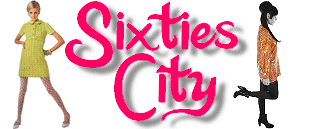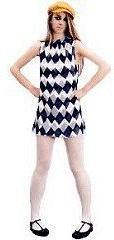|
Click on the banners to see the relevant pages |
|
1960s
 |
|
Hollywood 'Oscars' and Nominations
The
Trieste Festival Hugo
Awards Nebula
Awards
| The
Trieste Festival Of Science Fiction Films The Trieste awards began in 1963 with the science fiction equivalent of 'oscars' being awarded to the best sci-fi films. Although originally intended to encompass only pure science fiction they usually included consideration of productions from the horror and fantasy genres, the choice being very much dependent on the members who made up the panel which changed each year. Originally the winners were presented with awards which consisted of silver and golden 'Asteroids' but this was extended to medals and 'special' awards by the end of the decade.. 1963 Golden Asteroid: 'Ikarie XB-1' Golden Asteroid: 'La Jetee' Silver Asteroid: 'Chelovek Amfibiya' Silver Asteroid: 'The Man With X-Ray Eyes' 1964 Golden Asteroid: 'The Damned' 1965 Golden Asteroid: 'Alphaville' 1966 Golden Asteroid: 'Kdo Chce Zabit Jessu?' 1967 No Awards 1968 Golden Asteroid: 'The Sorcerers' Silver Asteroid: Actor Oleg Strizhenov for 'Yevo Zovut Robert' Silver Asteroid: Actress Catherine Lacey for 'The Sorcerers' Special Prize: 'Tummanost Andromedy' Gold Medal: Actor Boris Karloff for 'The Sorcerers' Gold Medal: 'Ne Jouez Pas Avec Les Martiens' 1969 Golden Asteroid: 'Le Dernier Homme' Silver Asteroid: Actor Tobias Engel for 'Tu Imagines Robinson' Silver Asteroid: Actress Ritva Vespa for 'Ruusujen Aika' Special Prize: 'Ruusujen Aika' |
Science
Fiction 'Oscars' and Nominations 1960 Oscar Winners: Special Effects: Tim Baar, Gene Warren for 'The Time Machine' Nominations: Art Direction / Set Decoration: Hal Pereira, Sam Comer, Arthur Krams, Walter Tyler for 'Visit To A Small Planet' 1963 Nominations: Special Visual Effects: John Stears for 'Thunderball' 1964 Oscar Winners: Sound Effects: Norman Wanstall for 'Goldfinger' Nominations: Best Picture: 'Dr. Strangelove' Best Actor: Peter Sellers for 'Dr. Strangelove' Best Director: Stanley Kubrick for 'Dr. Strangelove' Writing: Stanley Kubrick, Terry Southern and Peter George for 'Dr. Strangelove' 1965 Oscar Winners: Special Visual Effects: John Stears for 'Thunderball' 1966 Oscar Winners: Special Visual Effects: Art Cruickshank for 'Fantastic Voyage' Art Direction / Set Decoration: Jack Martin Smith, Walter M.Scott, Dale Hennesy, Stuart A.Reiss for 'Fantastic Voyage' Best Documentary: 'The War Game' Nominations: Cinematography (colour): Ernest Laszlo for 'Fantastic Voyage' Cinematography (black and white): James Wong Howe for 'Seconds' Film Editing: William B.Murphy for 'Fantastic Voyage' Sound Effects: Walter Ross for 'Fantastic Voyage' 1968 Oscar Winners: Best Actor: Cliff Robertson for 'Charly' Special Visual Effects: Stanley Kubrick for '2001 - A Space Odyssey' Honorary Award: Makeup: John Chambers for 'Planet Of The Apes' Nominations: Best Director: Stanley Kubrick for '2001 - A Space Odyssey' Writing: Arthur C.Clarke, Stanley Kubrick for '2001 - A Space Odyssey' Art Direction / Set Decoration: Tony Masters, Harry Lange, Ernie Archer for '2001 - A Space Odyssey' Costume Design: Morton Haack for 'Planet Of The Apes' Best Original Score: Jerry Goldsmith for 'Planet Of The Apes' Film Editing: Fred Feitshans, Eve Newman for 'Wild In The Streets' 1969 Oscar Winners: Special Visual Effects: Robbie Robertson for 'Marooned' Nominations: Cinematography: Daniel Fapp for 'Marooned' Sound: Les Fresholtz, Arthur Piantadosi for 'Marooned' |
 The Hugo Award was named in honor of Hugo Gernsback, "The Father of Magazine Science Fiction," as he was described in the Special Award presented to him in 1960. The Hugo Award, also known as the Science Fiction Achievement Award, is given annually by the World Science Fiction Society. The Hugo Awards are administered by the committee of the World Science Fiction Convention (Worldcon) held that year and are determined by nominations from and the voting of the membership of the WSFS. Usually, a Hugo awarded in a particular year is for work that appeared in the previous calendar year. 1960: Novel: Starship Troopers by Robert A. Heinlein Short Fiction: "Flowers for Algernon" by Daniel Keyes Dramatic Presentation: The Twilight Zone Professional Magazine: Fantasy & Science Fiction Professional Artist: Ed Emshwiller Fanzine: Cry of the Nameless (F. M. and Elinor Busby, Burnett Toskey, and Wally Weber, eds.) Special Award: Hugo Gernsback as "The Father of Magazine Science Fiction" 1961: Novel: A Canticle for Leibowitz by Walter M. Miller, Jr. Short Fiction: "The Longest Voyage" by Poul Anderson Dramatic Presentation: The Twilight Zone Professional Magazine: Astounding/Analog Professional Artist: Ed Emshwiller Fanzine: Who Killed Science Fiction? (Earl Kemp, ed.) 1962: Novel: Stranger in a Strange Land by Robert A. Heinlein Short Fiction: the "Hothouse" series by Brian W. Aldiss Dramatic Presentation: The Twilight Zone Professional Magazine: Analog Professional Artist: Ed Emshwiller Fanzine: Warhoon (Richard Bergeron, ed.) Special Award: Cele Goldsmith for editing Amazing and Fantastic Special Award: Donald H. Tuck for The Handbook of Science Fiction and Fantasy Special Award: Fritz Leiber and the Hoffman Electric Corp. for the use of science fiction in advertisements 1963: Novel: The Man in the High Castle by Philip K. Dick Short Fiction: "The Dragon Masters" by Jack Vance Dramatic Presentation: (No Award) Professional Magazine: Fantasy & Science Fiction Professional Artist: Roy G. Krenkel Amateur Magazine: Xero (Richard and Pat Lupoff, eds.) Special Award: P. Schuyler Miller for book reviews in Analog Special Award: Isaac Asimov for science articles in Fantasy & Science Fiction 1964: Novel: Way Station by Clifford D. Simak Short Fiction: "No Truce with Kings" by Poul Anderson Professional Magazine: Analog Professional Artist: Ed Emshwiller SF Book Publisher: Ace Books Amateur Magazine: Amra (George Scithers, ed.) 1965: Novel: The Wanderer by Fritz Leiber Short Story: "Soldier, Ask Not" by Gordon R. Dickson Special Drama: Dr. Strangelove Magazine: Analog Artist: John Schoenherr Publisher: Ballantine Fanzine: Yandro (Robert and Juanita Coulson, eds.) 1966: Novel: ... And Call Me Conrad by Roger Zelazny and Dune by Frank Herbert (tie) Short Fiction: " 'Repent, Harlequin!' Said the Ticktockman" by Harlan Ellison Professional Magazine: If Professional Artist: Frank Frazetta Amateur Magazine: ERB-dom (Camille Cazedessus, Jr., ed.) Best All-Time Series: the "Foundation" series by Isaac Asimov 1967: Novel: The Moon Is a Harsh Mistress by Robert A. Heinlein Novelette: "The Last Castle" by Jack Vance Short Story: "Neutron Star" by Larry Niven Dramatic Presentation: "The Menagerie" (Star Trek) Professional Magazine: If Professional Artist: Jack Gaughan Fanzine: Niekas (Ed Meskys and Felice Rolfe, eds.) Fan Writer: Alexei Panshin Fan Artist: Jack Gaughan Special Award: CBS Television for 21st Century 1968: Novel: Lord of Light by Roger Zelazny Novella: "Weyr Search" by Anne McCaffrey and "Riders of the Purple Wage" by Philip José Farmer (tie) Novelette: "Gonna Roll Them Bones" by Fritz Leiber Short Story: "I Have No Mouth, and I Must Scream" by Harlan Ellison Dramatic Presentation: "City on the Edge of Forever" (Star Trek, by Harlan Ellison) Professional Magazine: If Professional Artist: Jack Gaughan Fanzine: Amra (George Scithers, ed.) Fan Writer: Ted White Fan Artist: George Barr Special Award: Harlan Ellison for Dangerous Visions Special Award: Gene Roddenberry for Star Trek 1969: Novel: Stand on Zanzibar by John Brunner Novella: "Nightwings" by Robert Silverberg Novelette: "The Sharing of Flesh" by Poul Anderson Short Story: "The Beast That Shouted Love at the Heart of the World" by Harlan Ellison Dramatic Presentation: 2001: A Space Odyssey Professional Magazine: Fantasy & Science Fiction Professional Artist: Jack Gaughan Fanzine: Science Fiction Review (Richard E. Geis, ed.) Fan Writer: Harry Warner, Jr. Fan Artist: Vaughn Bodé Special Award: Neil Armstrong, Edwin Aldrin, and Michael Collins for "The Best Moon Landing Ever" |
 The Nebula Awards, first presented in 1965, are administered, voted and presented by the Science Fiction Writers of America (SFWA) to acknowledge excellence in science fiction writing. With some few exceptions, they are awarded in four categories: Novel, Novella, Novelette and Short Story. There is no cash prize associated with the award, the prize itself being a transparent block with an embedded glitter spiral nebula, and the glory and prestige of winning. 1965: Novel: "Dune" by Frank Herbert Novella: "The Saliva Tree" by Brian W. Aldiss and "He Who Shapes" by Roger Zelazny (tie) Novelette: "The Doors of His Face, the Lamps of His Mouth" by Roger Zelazny Short Story: "Repent, Harlequin!" Said the Ticktockman", by Harlan Ellison 1966: Novel: "Flowers for Algernon, by Daniel Keyes and "Babel-17" by Samuel R. Delany (tie) Novella: "The Last Castle" by Jack Vance Novelette: "Call Him Lord" by Gordon R. Dickson Short Story: "The Secret Place" by Richard McKenna 1967: Novel: "The Einstein Intersection" by Samuel R. Delany Novella: "Behold the Man" by Michael Moorcock Novelette: "Gonna Roll the Bones" by Fritz Leiber Short Story: "Aye, and Gomorrah" by Samuel R. Delany 1968: Novel: "Rite of Passage" by Alexei Panshin Novella: "Dragonrider" by Anne McCaffrey Novelette: "Mother to the World" by Richard Wilson Short Story: "The Planners" by Kate Wilhelm 1969: Novel: "The Left Hand of Darkness" by Ursula K. Le Guin Novella: "A Boy and His Dog" by Harlan Ellison Novelette: "Time Considered as a Helix of Semi-Precious Stones" by Samuel R. Delany Short Story: "Passengers" by Robert Silverberg |
|
All
Original Material
|

